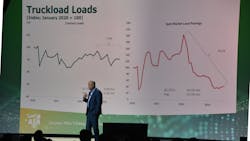AUSTIN—For-hire fleets can look forward to improving market conditions; rather, the surviving fleets can, as Bob Costello, chief economist for ATA, told annual convention attendees here Monday.
“We are going to continue to see more supply leaving this industry and, even though demand is not going to pick up much, a couple quarters from now things are definitely going to start to feel a little bit better for you,” Costello said.
Fleets shouldn’t expect a rebound to 2021 levels of freight and high rates, he was quick to note, calling the pandemic boom “the party” and subsequent freight recession “the hangover.”
In laying out the conditions that led to the freight rise and fall, Costello pointed to the spike in homebound consumer spending during covid which was replaced by consumer spending on “experiences” such as concerts, movies, and travel once people could get and out and about again. Simply, there’s not a lot of freight associated with experiences.
See also: Economic concerns top trucking industry’s worries going into 2024
Inventories, which were depleted during the pandemic and subsequent supply chain struggles, were replenished to the point of being overstocked—and so freight took another hit.
On the positive side, projects funded by federal infrastructure investment are coming online, and U.S. manufacturing, while recently “flattish” after “a couple of really good years,” shows promise going forward.
“I am very bullish on U.S. manufacturing, North American manufacturing," Costello said. "This idea of nearshoring or reshoring—whatever you want call it—is real. It is happening. It doesn't happen overnight, but we know it is, in fact, happening.”
In support of his suggestion, Costello presented data showing that Mexico had surpassed China the largest trading partner with the U.S., and Canada is gaining fast.
In wrapping up his take on the broader economy, Costello explained that while inflation has been higher than Americans have experienced since the 1980s, it’s come down rapidly. But it won’t be going away while the labor market remains tight.
“I think we're ultimately going to settle out at a higher level of inflation than we've been used to, somewhere around 2.5% to a little over 3% a year,” Costello said.
See also: Freight, equipment markets stuck in neutral into 2024
Fleet factors
One of the consequences of the pandemic spike in freight was that many carriers simply didn’t have the capacity to meet shipper demand, so shippers turned to the spot market at unprecedented rates. And, as with every freight cycle, a strong spot market invites new entrants to the for-hire trucking space.
But once consumers started going out to eat, rather than upgrading their own kitchens, the spot freight market crashed, with loads now down 78% from the peak, as Costello detailed. At the same time, contract loads were down only 2%-3%.
“This is very important because the people that play in the spot market—that's where they get the bulk of their freight—those are the companies in trouble,” he said. “Everybody's got some exposure to the spot market—you've got a backhaul, whatever—but for the ones that play in that sand box all the time, that's a tough, tough place to be right now because it’s the worst we have seen.”
See also: Spot rates are lowest in three years, moderate expectations for Class 8 trucks and trailers
But even as those players in the spot market are being forced out and, in theory, reducing capacity, Costello reported the number of power units in operation was recently up 7%.
“This is a net change, and it is up almost 7% in a down market. That's a little alarming, right?” he said. “But I point out this is the equipment for all those millions of loads and billions of dollars or revenue every month, and you're still off 5% from the peak. Of course we have too much supply—you don't need me up here telling you that. But I would encourage you to realize we're not back to where we were. When some of the supply in other areas of the market leave, I think it's going to feel a little bit better.”
Costello reemphasized that, near-term, for-hire market improvement is going to come from the supply side rather than from a freight rebound. New entrants who came in during the spot rate boom (and when used truck prices were at their highest) are leaving as spot rates fall and fuel prices rise.
“There's going to be more and more folks going out of business,” he said. “You folks in this room can weather this storm better than many of them.
“We may still get a recession, but I do think that it will impact the services side of the economy more than the goods side—because we've already been hammered. Again, this is not a demand side story.”
About the Author
Kevin Jones
Editor
Kevin has served as editor-in-chief of Trailer/Body Builders magazine since 2017—just the third editor in the magazine’s 60 years. He is also editorial director for Endeavor Business Media’s Commercial Vehicle group, which includes FleetOwner, Bulk Transporter, Refrigerated Transporter, American Trucker, and Fleet Maintenance magazines and websites.
Working from Beaufort, S.C., Kevin has covered trucking and manufacturing for nearly 20 years. His writing and commentary about the trucking industry and, previously, business and government, has been recognized with numerous state, regional, and national journalism awards.


